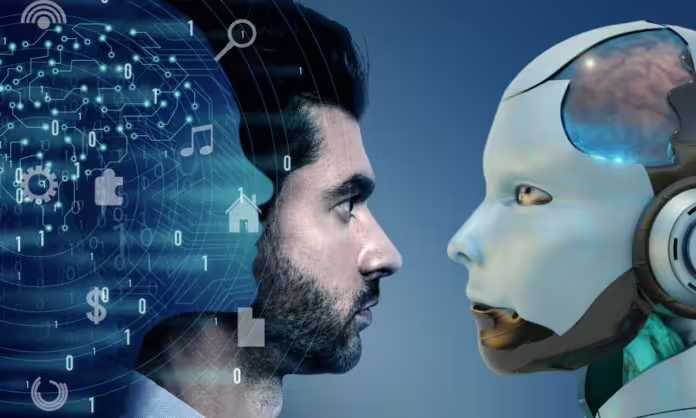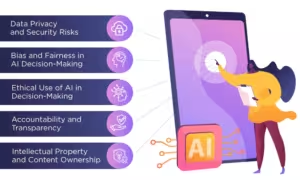The way AI is being used in our lives and how dependable humans are upon AI is worth talking about. Everyday something pops up which is from AI or is influenced by AI. As the influence of AI grows in our lives, there needs to be ethical considerations when using generative AI as the power of AI could be misused. Did you ever think about the ethical considerations when using generative AI? The AI which has the ability to design new content like images, videos, audios and texts is the generative AI. As generative AI grows, it is a priority to think about the ethical considerations that are a part of it.
We will explore the most pressing ethical issues tied to generative AI and why addressing them is crucial for both society and technological progress.
Understanding the Impact of Generative AI
Generative AI refers to systems that create data, including text, images, or even entire virtual environments, based on patterns and inputs they have learned from large datasets. While these systems offer immense potential in industries like marketing, medicine, and entertainment, the rapid deployment of AI technology has raised significant ethical concerns.
The widespread integration of AI systems requires careful assessment, not just of what these tools can accomplish, but also of the potential risks they pose to privacy, fairness, and human agency. Ethical consideration in AI development is paramount to ensure the technology benefits everyone while minimizing harm.
- Data Privacy and Security Risks
One of the most critical disparaging issues in generative AI circles around data privacy. AI models rely on vast amounts of data, often sourced from user interactions, social media platforms, or publicly available databases. Many consumers, however, are ignorant of the methods utilized to gather, store, and train these algorithms using personal data.
An essential ethical consideration in AI is whether personal data is being used with proper consent. This concern becomes even more significant when sensitive information, such as medical records or personal identifiers, is involved. Data breaches or misuse can have severe consequences, ranging from identity theft to loss of trust in technology providers.
Organizations must implement strict data protection policies and ensure transparency in how data is sourced for AI development. Additionally, users should be informed about how their data is being used and given the option to opt out when necessary.
- Bias and Fairness in AI Decision-Making
Another crucial ethical consideration in AI is the risk of bias in machine-generated outputs. Because generative AI models are trained on preexisting data, biases in the data may occasionally be replicated or amplified. For example, a generative AI used for hiring decisions might favour certain demographic groups if its training data includes historical biases against other groups.
This issue extends beyond hiring practices. AI systems have been shown to exhibit bias in legal judgments, medical diagnoses, and even content moderation on social platforms. Addressing bias requires not only improving the diversity of training datasets but also developing algorithms that can identify and mitigate unfair practices.
AI developers must be aware of this chauvinism and actively work to intercept them. Ensuring fairness in AI systems is an ongoing process that requires regular updates and improvements based on new data and ethical standards.
- Accountability and Transparency
The rise of generative AI raises significant concerns about accountability. If an AI system generates detrimental or deceptive content, who is responsible? Is it the company that developed the AI, the users who interacted with it, or the system itself?
A related ethical consideration in AI is the concept of “black box” algorithms, where the decision-making process of the AI is not transparent or understandable even to its developers. This lack of transparency can make it difficult to hold anyone accountable for the system’s outputs, particularly when the AI is deployed in high-stakes environments such as healthcare or criminal justice.
To address this issue, developers must strive to create AI systems that are explainable and transparent. Users should have access to information about how the AI functions, including the criteria it uses for decision-making. A smooth level of transparency will help construct trust and guarantee that AI systems are used responsibly.
- Intellectual Property and Content Ownership
Generative AI turned the lines of content proprietary rights and intellectual property (IP) fogged. For instance, if an AI creates a piece of art, music, or text, who owns the rights to that creation—the AI, the developer, or the person who prompted the AI?
This question presents a significant ethical dilemma, particularly as AI-generated content becomes more prevalent. Artists and creators have expressed concerns that AI systems trained on their work might produce similar outputs, effectively devaluing their intellectual property.
As generative AI continues to evolve, laws and regulations around IP must also adapt. Establishing clear guidelines on ownership rights for AI-generated content will be essential in protecting creators while fostering innovation.
- Ethical Use of AI in Decision-Making
Conclusively, the ethical consideration in AI arranges to its use in decision-making processes. As more industries adopt AI for tasks like hiring, loan approvals, and even legal judgments, it’s crucial to ensure that these systems are used ethically. Relying too heavily on AI without human oversight could lead to unfair decisions that lack nuance and context.
Complementing the human judgement by AI is appreciated rather than replacing it. Ethical AI use involves maintaining human oversight and intervention in critical decision-making processes, ensuring that the technology serves as a tool for better outcomes, not as a final authority.
Conclusion
Generative AI holds the promise of revolutionizing industries and enhancing human capabilities, but it also presents significant ethical challenges. Data privacy, bias, accountability, intellectual property, and responsible use in decision-making are just a few of the many ethical considerations in AI that developers and policymakers must address. By confronting these issues head-on, we can ensure that AI development aligns with ethical standards and creates benefits for all, not just a select few.
Read More:
Exploring the Implications of Generative AI natural language processing for Marketers


